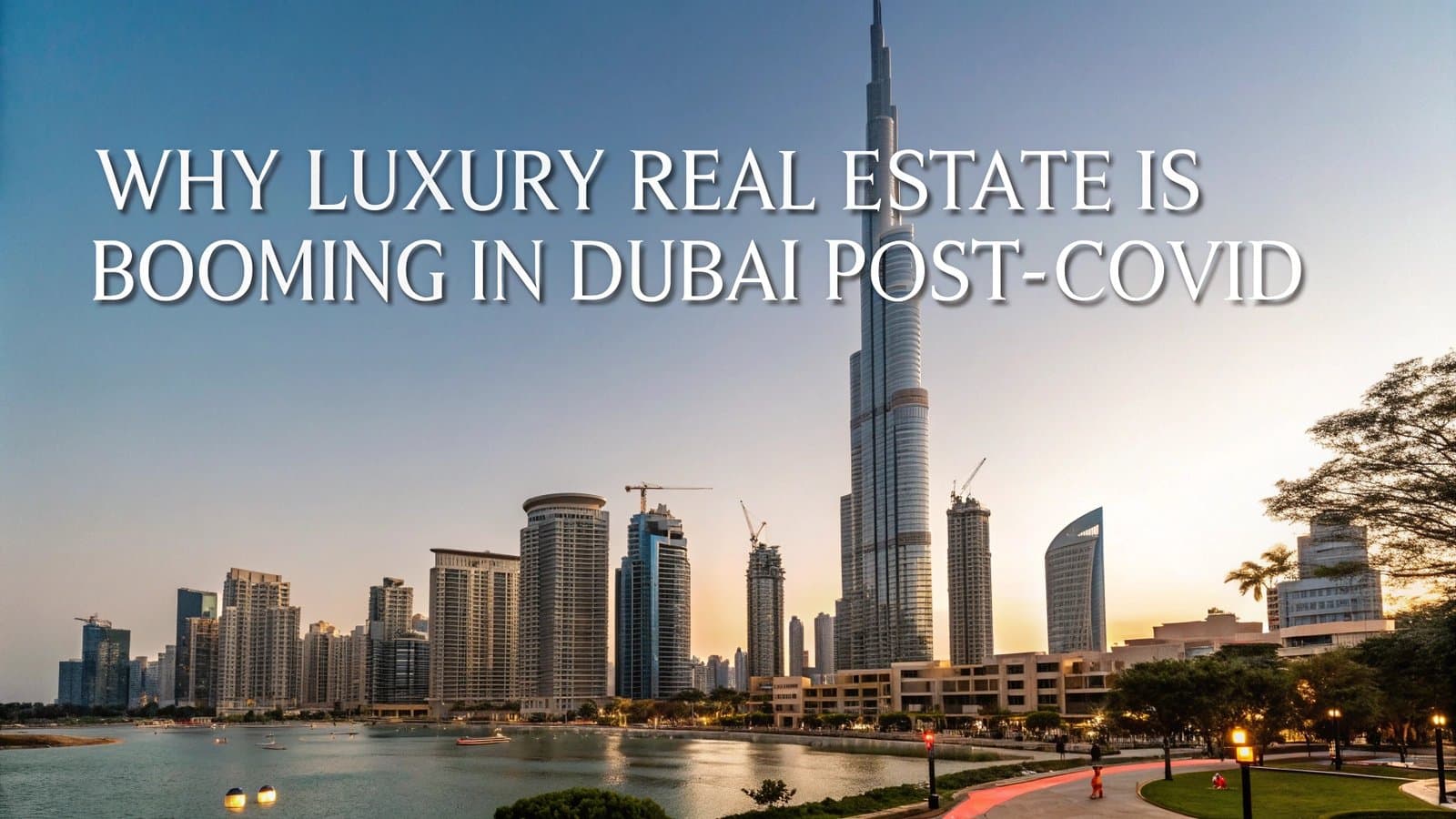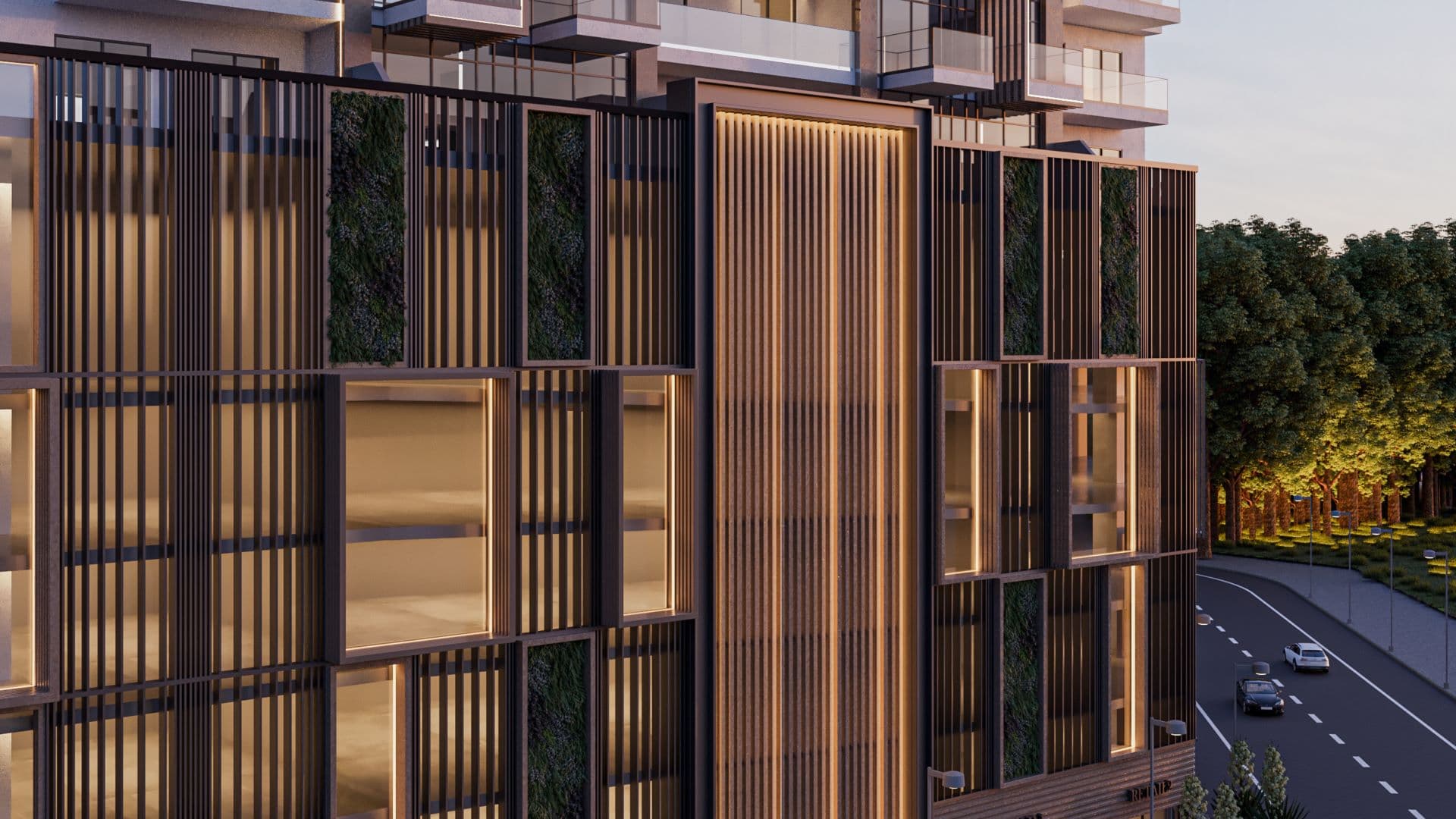Why Luxury Real Estate is Booming in Dubai Post-COVID

Dubai, a global icon of luxury and innovation, has solidified its position as a leading destination for luxury real estate in Dubai in the post-COVID era. The city’s real estate market has not only recovered from the pandemic but has surged ahead, driven by economic resilience, investor-friendly policies, and a growing appetite for high-end properties. As we navigate 2025, Dubai’s luxury real estate market continues to attract global investors and homeowners, offering unparalleled opportunities for wealth creation and upscale living. This article explores the key factors behind this boom, current trends, investment potential, and the future outlook for luxury real estate in Dubai, providing a comprehensive guide for those looking to capitalize on this dynamic market.
Introduction: A Resurgent Market
The COVID-19 pandemic disrupted global economies, but Dubai’s real estate market emerged stronger, particularly in the luxury segment. In 2024, the city recorded 226,000 real estate transactions worth AED 761 billion, reflecting a 36% increase in volume and a 20% rise in value year-over-year, according to Emaar Properties. This growth underscores Dubai’s appeal as a safe haven for wealth and a hub for luxury living. High-net-worth individuals, expatriates, and international investors are flocking to iconic locations like Palm Jumeirah, Downtown Dubai, and Dubai Marina, where luxury real estate in Dubai offers both lifestyle benefits and high returns.
In 2025, the market is poised for continued growth, with property values expected to rise by 5-8% and rental yields averaging 7%, as noted by DAMAC Properties. Despite a projected oversupply of 210,000 units in 2025-2026, which may lead to a price correction of up to 15% (Reuters), the demand for luxury properties remains robust, driven by Dubai’s unique blend of economic stability, innovation, and global appeal.
Market Overview: A Thriving Landscape
Dubai’s real estate market has shown remarkable resilience post-COVID. The city’s population grew by 5% to over 3.8 million in 2024, while tourist arrivals increased by 9% to 18.7 million, boosting demand for both residential and short-term rental properties (Deloitte). The economy expanded by 3.2%, reaching a GDP of AED 231 billion, with the real estate sector playing a pivotal role.
The luxury segment, in particular, has seen significant growth. Residential prices surged by 9% in the 12 months leading up to Q1 2024, and transaction volumes hit record highs, with 39,000 property transactions in Q2 2024 alone, dominated by apartments (DAMAC Properties). Off-plan properties accounted for 60% of sales in 2023, reflecting investor confidence in future appreciation.
| Metric | 2024 Data | 2025 Projection |
|---|---|---|
| Total Transactions | 226,000 | Expected to grow |
| Transaction Value | AED 761 billion | 5–8% value increase |
| Residential Price Growth | 9% (Q1 2023–Q1 2024) | 5–8% annual growth |
| Rental Yields | 5–8% | Average 7% |
| New Unit Deliveries | - | ~210,000 (2025–2026) |
Factors Driving the Boom
Several factors have contributed to the surge in luxury real estate in Dubai post-COVID, creating a fertile environment for investment and growth.
Economic Stability and Growth
Dubai’s economy has rebounded strongly, with a 4% growth in 2024, driven by non-oil sectors like real estate, tourism, and trade (Global Property Guide). The UAE Central Bank projects a 6.2% GDP growth in 2025, with real estate as a key driver (Colife). This stability attracts investors seeking secure markets for wealth preservation.
Investor-Friendly Policies
Dubai’s government has implemented policies to enhance its appeal to foreign investors:
100% Foreign Ownership: Freehold areas allow full property ownership by foreigners.
Golden Visas: Long-term residency for investors purchasing properties above AED 2 million.
No Income Tax: Tax-free rental income maximizes returns.
Relaxed Visa Rules: Remote work and retirement visas attract new residents.
These measures have driven a significant portion of property purchases by foreign investors, particularly from Europe, Asia, and Russia (Forbes).
Tourism and Population Growth
The influx of 18.7 million tourists in 2024 and a growing population have increased demand for luxury residences, both for personal use and short-term rentals. Dubai’s status as a global tourism hub, with attractions like Burj Khalifa and Dubai Mall, ensures a steady flow of high-net-worth visitors, many of whom become investors (Deloitte).
Infrastructure Development
Ongoing projects like Expo City Dubai, Dubai Metro expansion, and the Dubai 2040 Urban Master Plan enhance connectivity and property values. These developments create new investment hotspots, such as Dubai Creek Harbour and Emaar South (Emaar Properties).
Shift Towards Luxury and Sustainable Living
Post-COVID, there’s a global trend towards luxury properties that offer sustainability and technology. Dubai’s developers are responding with eco-friendly projects like Dubai Sustainable City and smart homes with features like automated lighting and EV charging stations, appealing to environmentally conscious buyers (Forbes).
Luxury Real Estate Trends in 2025
The luxury real estate market in Dubai is characterized by several trends that reflect evolving buyer preferences and market dynamics.
Demand for Ultra-Luxury Properties
High-net-worth individuals are driving demand for branded residences and waterfront penthouses in areas like Emaar Beachfront and The Oasis. These properties offer world-class amenities, such as private pools and concierge services, positioning them as symbols of exclusivity (Emaar Properties).
Prime Location Shortages
A shortage of properties in prime locations like Palm Jumeirah and Downtown Dubai is pushing prices upward, with a projected 5% value increase in 2025. This scarcity enhances the appeal of off-plan projects in emerging areas (Emaar Properties).
Off-Plan Investments
Off-plan properties dominate, offering flexible payment plans and strong appreciation potential. Investors are drawn to projects by reputable developers like Emaar and DAMAC, which promise high returns upon completion (Forbes).
Sustainable and Smart Developments
Green-certified properties with energy-efficient designs and smart home technologies are in high demand. Projects aligning with the UAE’s Net-Zero 2050 goals, such as those with EV charging stations, are particularly attractive (Emaar Properties).
Community-Centric Living
Master-planned communities like Dubai Hills Estate and Dubai Creek Harbour offer co-living spaces, coworking areas, and retail hubs, enhancing lifestyle and property value. These developments cater to buyers seeking integrated living experiences (Emaar Properties).
| Trend | Key Features | Prime Locations |
|---|---|---|
| Ultra-Luxury Properties | Branded residences, waterfront penthouses | Emaar Beachfront, The Oasis |
| Off-Plan Investments | Flexible payment plans, high ROI | Dubai Creek Harbour, Emaar South |
| Sustainable Developments | Green-certified, smart homes | Dubai Sustainable City |
| Community-Centric Living | Co-living, retail hubs | Dubai Hills Estate, Rashid Yachts |
Investment Opportunities
Investing in luxury real estate in Dubai offers compelling benefits, making it a top choice for global investors.
High Rental Yields
Luxury properties yield 5-8%, with prime areas like Downtown Dubai offering even higher returns. Short-term rentals in tourist hotspots provide flexible terms and higher per-night rates, ideal for quick profits (Forbes).
Capital Appreciation
Property values rose 9% in the year to Q1 2024, with 5-8% growth expected in 2025. Off-plan investments in emerging areas like Emaar South offer significant appreciation potential (DAMAC Properties).
Diverse Property Options
From apartments to villas, Dubai’s luxury market caters to varied investment goals. Branded residences and waterfront properties appeal to high-net-worth buyers, while off-plan apartments suit budget-conscious investors (Emaar Properties).
Global Appeal
Dubai’s status as a business and tourism hub ensures steady demand. Its strategic location, world-class infrastructure, and vibrant lifestyle attract expatriates and tourists, many of whom become investors (Deloitte).
Safety and Stability
Dubai’s low crime rates, political stability, and robust legal framework, overseen by the Dubai Land Department (DLD) and Real Estate Regulatory Agency (RERA), protect investors (Forbes).
Challenges and Risks
While the outlook is positive, investors should consider potential challenges:
Oversupply
An estimated 210,000 units will be delivered in 2025-2026, potentially leading to a 15% price correction. However, strong demand for luxury properties in prime locations may mitigate this impact (Reuters).
Global Economic Factors
Oil price fluctuations and global economic uncertainties could affect investor sentiment. Dubai’s diversified economy helps buffer these risks (Global Property Guide).
Additional Costs
Investors must budget for a 4% registration fee, service charges, and developer fees, which can impact returns (Forbes).
Future Outlook
In 2025, luxury real estate in Dubai is expected to maintain its growth trajectory, driven by innovation, sustainability, and community-centric developments. Emerging trends like smart cities and integrated communities will shape the market, offering new opportunities for investors. Despite potential price corrections, Dubai’s strategic vision and global appeal ensure long-term prosperity.
The boom in luxury real estate in Dubai post-COVID is a testament to the city’s resilience and strategic foresight. Economic stability, investor-friendly policies, tourism growth, and a focus on luxury and sustainability have created a thriving market. With high rental yields, capital appreciation potential, and a diverse range of properties, Dubai offers unmatched opportunities for investors and homeowners. As the city continues to evolve, now is an ideal time to explore luxury real estate in Dubai and secure a stake in this dynamic market. For more information, contact reputable agents via Property Finder UAE or explore projects by Emaar Properties.
